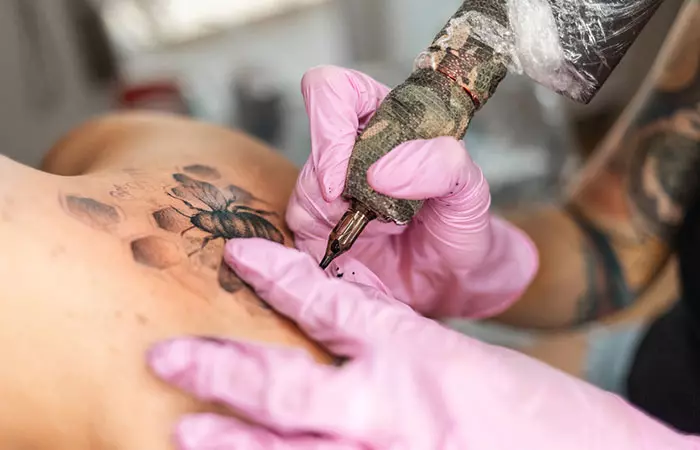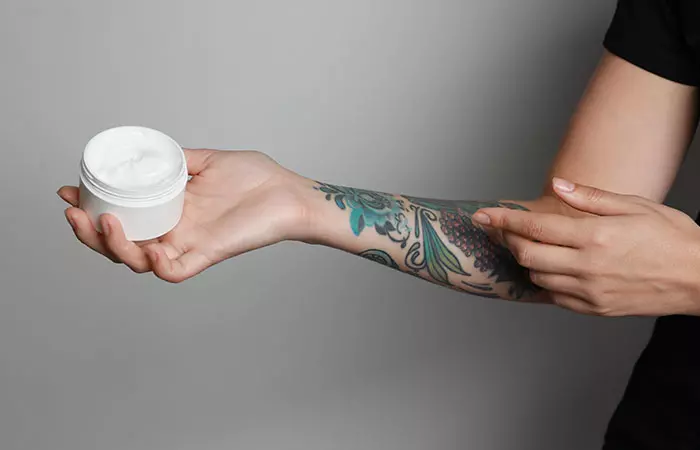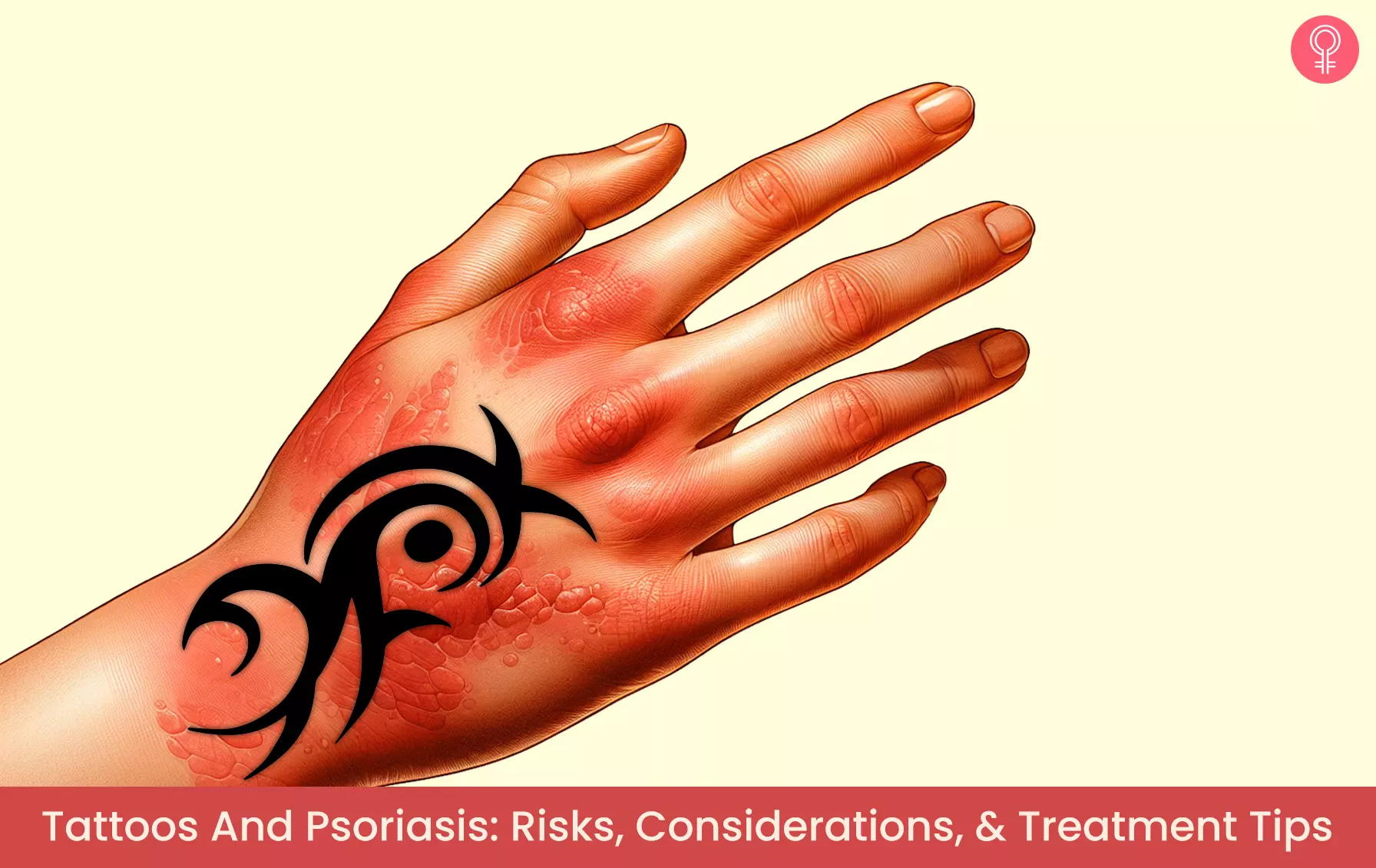
The topic of tattoos and psoriasis requires careful consideration. While most people get a tattoo without giving it much thought, people with psoriasis should think twice before doing so. Psoriasis is a chronic skin condition characterized by thick, scaly patches of skin. The smallest cut, insect bite, or wound can cause an instant flare-up. So if you’ve been thinking about getting a tattoo and want to know how this common inflammatory skin condition can affect your body art, you’ve come to the right place. In this article, we’ll dive deeper into whether you can get a tattoo over your psoriasis, the potential risks of tattooing, precautions to keep in mind, and more. Scroll down to read more!
Can you get a tattoo over psoriasis patches?
 Image: IStock
Image: IStock
Tattooing over psoriasis can present a number of challenges due to the unpredictable nature of the skin. Psoriasis is a chronic skin disease in which the immune system becomes hyperactive, causing skin cells to grow rapidly. This immune response results in red patches, silvery-white scales, and itchy skin (1). Tattooing requires the application of tattoo inks into the deeper layers of the skin. This can worsen flare-ups and affect the overall appearance of the tattoo. While it is possible to get tattoos with psoriasis, one should consider the placement of the tattoo and the risks involved before getting one.
YouTuber Imogen Jones shared her experience of getting a tattoo while suffering from psoriasis. She said: “Today I started with a really small psoriasis on one of my tattoos (i).” She further shared: “There’s a common misconception that if you have psoriasis or eczema you can’t get a tattoo, that’s not true.”
Although tattooing on psoriasis-affected skin is possible, it carries an increased risk of flare-ups. See the next section for more information.
Can a tattoo cause psoriasis flare-ups?
In short, yes. Tattoos can trigger psoriasis flare-ups due to the trauma to the skin caused during the entire tattooing procedure. The immune system responds by aggravating the existing patches and causing new scaly psoriasis plaques to form. A study of 90 Finnish psoriasis patients found that 30% reported acute flare-ups within the first few weeks of getting tattooed (2). Therefore, consult with your healthcare providers before getting tattooed to reduce the potential risks of tattoos.
It is important to understand the potential risks associated with tattooing on psoriatic skin. Read more in the next section.
Risks of Getting a Tattoo If You Have Psoriasis
 Image: Shutterstock
Image: Shutterstock
Getting a psoriasis tattoo can pose the following risks to your skin health:
Can cause the Koebner phenomenon: Also known as the isomorphic reaction, it is the development of skin lesions on previously unaffected skin in response to skin trauma or skin injury (2). May cause uneven healing: Tattooed skin in psoriasis can heal unevenly and affect the appearance of the tattoo. May increase the risk of infection: Psoriatic skin is characterized by a weakened skin barrier, which may increase the risk of developing fungal and bacterial infections (1), (3). May cause allergic reactions: Skin prone to psoriasis may react negatively to the pigments in tattoo ink, which can cause allergic reactions (4).
In addition to the risks mentioned above, you should be prepared for the possibility of rejection from the tattoo artist. This can be due to lack of experience or state laws that prevent reputable studios from tattooing on skin conditions, especially psoriatic lesions.

The Koebner phenomenon was first described by German physician Heinrich Koebner in 1876, after he observed new psoriatic lesions on the healthy skin of patients with psoriasis.
Understanding the risks associated with tattooing psoriatic skin can help you make an informed decision. But taking precautions before getting tattooed can help reduce your risk of developing these problems in the first place. Check out the next section to learn more.
Precautions to keep in mind before getting a tattoo
There are certain precautions you can take before getting a tattoo with psoriasis to minimize potential risks. Start by consulting a dermatologist to assess the health of your skin. Choose tattoo sites away from active psoriatic plaques and flare-ups. Ensure that optimal hygiene protocols are followed during tattooing to reduce the risk of skin infections. Finally, strictly adhere to aftercare instructions for optimal healing of tattooed skin and psoriasis treatment.
Sena, a blogger, shared her tattoo and psoriasis journey in her blog post. She wrote, “My recommendation to people with psoriasis who want to get a tattoo is… Don’t get tattooed if your psoriasis is severely inflamed. This will make your psoriasis worse and potentially ruin your tattoo (waste of money). I decided it was safe to get tattooed since my psoriasis is minimal at the moment (ii).”

Check to see if the tattoo shop has an autoclave to ensure the instruments are properly sterilized.
In some cases, following the right precautions can still lead to a psoriasis flare-up after getting tattooed. But don’t worry. Scroll down to the next section for some simple remedies you can follow.
How to Treat Psoriasis Flares After Getting a Tattoo
 Image: Shutterstock
Image: Shutterstock
Here are some ways to help relieve your psoriasis flare-ups and improve your overall skin condition:
Use topical treatments: Apply a thin layer of cortisone ointment or cream to soothe inflamed skin and itching. Try light therapy: Treatment consists of exposing the affected skin to artificial sunlight in an attempt to combat the condition. Apply a moisturizer: Use fragrance- and alcohol-free moisturizers to prevent excessive dryness, itching and redness. Consult a dermatologist: Seek professional help for proper treatment of psoriasis and your tattoos. Take oral medications: You may take oral retinoids and other medications prescribed by a doctor to help control the inflammation process and flare-ups.
The topic of tattoos and psoriasis requires proactive measures and careful consideration. Tattooing with psoriasis can lead to flare-ups and worsening of your psoriasis. However, strategic tattoo placement, good hygiene protocols, and personalized tattoo aftercare can help prevent tattoo-related complications. Sometimes, flare-ups after tattooing can still occur if you take the right precautions. In that case, consult your doctor and take the necessary medications to properly manage your symptoms.
Frequently Asked Questions
Should I tell my tattoo artist about my psoriasis?
Yes, informing your tattoo artist about your psoriasis beforehand can help minimize potential complications from your tattoo, such as flare-ups, uneven healing, and skin allergies. This information can also help them create a customized aftercare plan to ensure a properly healing tattoo.
What should someone with psoriasis look for when choosing a professional tattoo studio or artist?
Visit the tattoo studio and talk to the tattoo artist. Make sure they follow proper hygiene protocol and sterilization processes, such as using gloves during the tattoo procedure, ink once from an individual cup, and ink with no recalls.
Are there specific aftercare steps for tattoos on psoriasis-affected skin?
You can follow the aftercare steps suggested by your dermatologist to ensure optimal healing. Always opt for a psoriasis-friendly cream or ointment to moisturize the affected area and soothe skin irritation and inflammation. Also, avoid swimming and sun exposure for a few weeks after tattooing to prevent infection of the tattoo and delay of the healing process.
Which places are safest for tattoos if I have psoriasis?
This varies from person to person. However, people with psoriasis should choose an area without skin lesions and psoriasis plaques.
Can psoriasis medications disrupt tattoo healing?
Research suggests that the immunosuppressive therapy prescribed to treat psoriasis can weaken the immune system. This can increase the risk of infection during the aftercare process (3). Therefore, consult a dermatologist to make sure it is safe to get a tattoo with psoriasis.
Key Points
Psoriasis is an autoimmune skin condition characterized by silvery-white patches and red scales on the body. Tattooing on skin affected by psoriasis can increase the risk of allergic reactions, skin infections, and uneven healing. Choosing the right tattoo location and strictly following your tattoo artist’s aftercare instructions can reduce potential tattoo risks. Your dermatologist can prescribe ointments or oral medications to treat psoriasis symptoms after getting a tattoo.
Image: Dall·E/StyleCraze Design Team
If you want a tattoo but don’t know how it will affect your psoriasis, look no further. Watch this video for some interesting information on the subject to help you make an informed decision.
Personal experience: Source
Was this article helpful? AuthorEditorFact Checker
![]() Pahul Nanra is a content writer with a passion for all things fashion and beauty. She has two years of experience writing on beauty and lifestyle genres. She is an English Honours graduate from Delhi University with a diploma in Fashion Designing from YMCA.
Pahul Nanra is a content writer with a passion for all things fashion and beauty. She has two years of experience writing on beauty and lifestyle genres. She is an English Honours graduate from Delhi University with a diploma in Fashion Designing from YMCA.
Read Pahul Nanra’s full biography
![]() Eshna is an associate editor and certified skin care coach. She has over three years of experience, a triple major bachelor’s degree in psychology, English and journalism from Mount Carmel College, Bengaluru, and a master’s degree in psychology from Sampurna Montfort College, Bengaluru.
Eshna is an associate editor and certified skin care coach. She has over three years of experience, a triple major bachelor’s degree in psychology, English and journalism from Mount Carmel College, Bengaluru, and a master’s degree in psychology from Sampurna Montfort College, Bengaluru.
Read the full biography of Eshna Das
![]() Manjari is a beauty and lifestyle writer with over three years of experience writing across various niches including beauty, health, wellness, and technology. She first discovered her passion for writing in school and has been honing her craft ever since.
Manjari is a beauty and lifestyle writer with over three years of experience writing across various niches including beauty, health, wellness, and technology. She first discovered her passion for writing in school and has been honing her craft ever since.
Read the full biography of Manjari Uppal
Leave a Reply